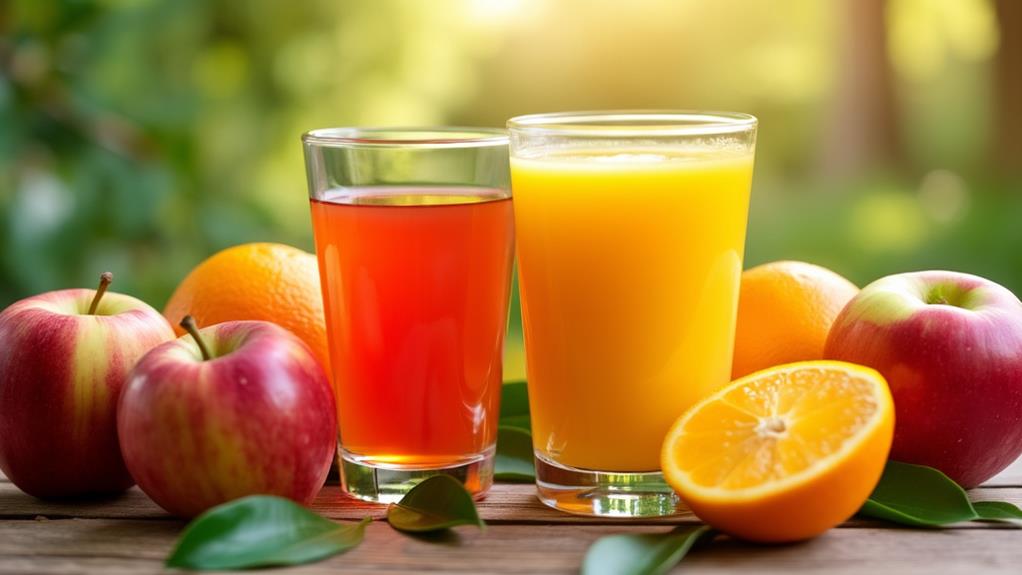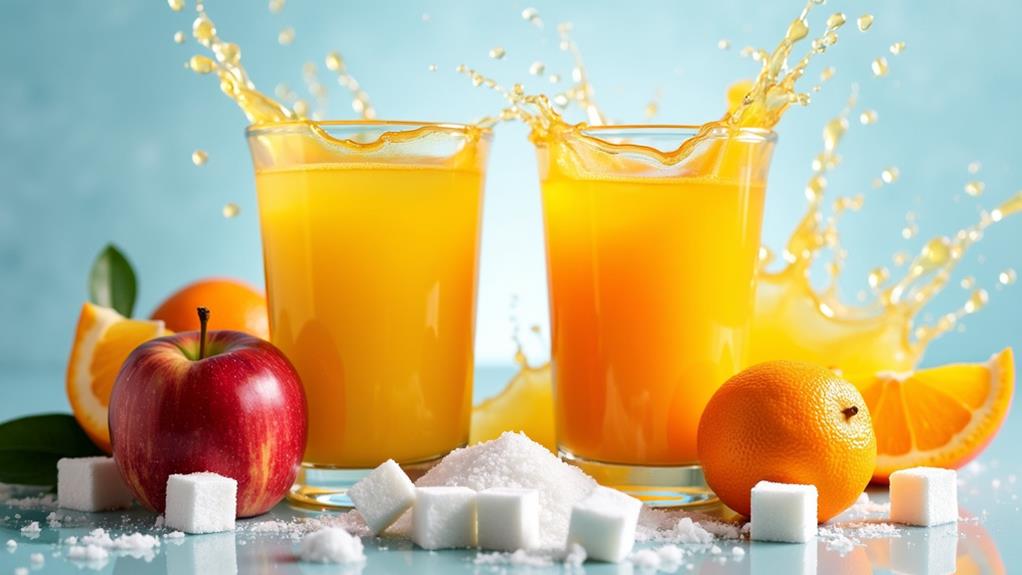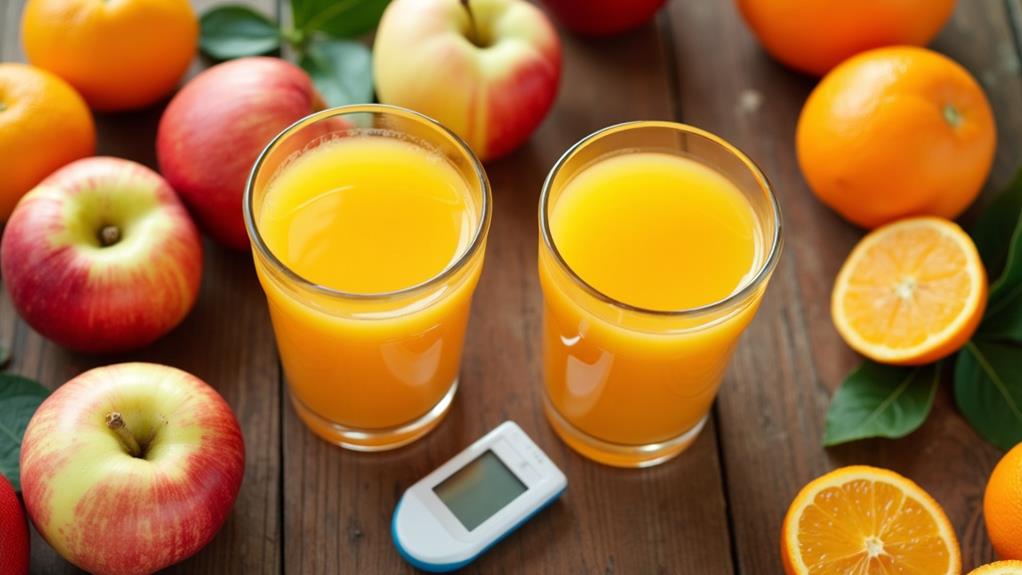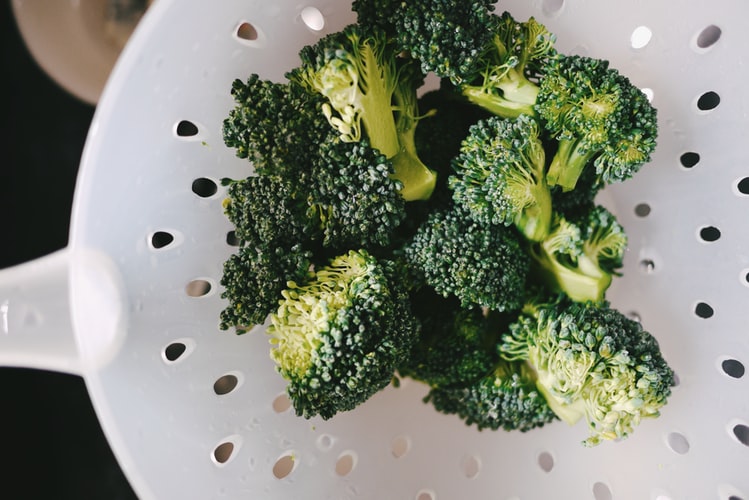Apple Juice Vs Orange Juice: Which Is Healthier?

When deciding between apple juice and orange juice for a healthy start to your day, it's important to consider their distinct benefits. Apple juice has a lower glycemic index and contains more fiber, aiding digestion. On the other hand, orange juice is rich in vitamin C and potassium. However, the acidity in orange juice may cause digestive issues for some individuals. To determine which juice offers the most health benefits, let's delve deeper into their nutritional profiles.
Nutritional Overview
When comparing the nutritional profiles of apple juice and orange juice, you'll find some notable differences and similarities. Both juices are predominantly water, with approximately 88% water and 12% nutrients. However, their nutritional values differ in several aspects. For instance, a 100g serving of apple juice provides around 46 calories and 11.3g of carbohydrates, while the same amount of orange juice contains 45 calories and 10.4g of carbohydrates.
Orange juice stands out with its high potassium content, nearly double that of apple juice, making it a better option for maintaining electrolyte balance. Additionally, orange juice is rich in vitamins B1 (thiamine) and folate, which contribute to improved energy metabolism and red blood cell formation.
On the other hand, apple juice is abundant in antioxidants, particularly quercetin, which can help reduce inflammation and support heart health. However, it is important to consider the sugar content. Apple juice has slightly more sugar, about 24g per cup, compared to orange juice's 21g. This higher sugar content may affect blood sugar levels differently, influencing your choice based on dietary needs.
Vitamin Comparison
Both apple juice and orange juice offer diverse health benefits, but their vitamin content markedly differs. Orange juice is a powerhouse of vitamin C, providing about 124mg per cup, whereas apple juice contains roughly 95mg per cup. This vital nutrient is important for your immune system, so if you aim to enhance your vitamin C intake, orange juice is the clear winner.
Orange juice also features significant amounts of folate, potassium, and thiamine, which contribute to DNA synthesis, nerve function, and overall cellular health. Conversely, while apple juice is lower in these vitamins, it contains phenolic compounds that offer antioxidant benefits.
Here's a quick comparison to help you visualize the differences:
| Nutrient | Apple Juice | Orange Juice |
|---|---|---|
| Vitamin C | 95mg | 124mg |
| Folate | Low | High |
| Thiamine (B1) | Low | High |
Both juices are relatively low in vitamins A and B12. However, apple juice offers more magnesium compared to orange juice. Always check the labels for the best nutritional benefits, as vitamin content can vary by brand and processing method.
Mineral Content

Orange juice and apple juice differ significantly in their mineral content, affecting their respective health benefits. When comparing the two, orange juice stands out in several key areas:
- Potassium: Orange juice contains nearly double the potassium of apple juice, offering about 250 mg per cup versus apple juice's 120 mg. Potassium is essential for heart health and muscle function.
- Magnesium and Calcium: Orange juice has higher amounts of magnesium and calcium compared to apple juice. These minerals are crucial for bone health.
- Copper: A 100g serving of orange juice provides approximately 0.14 mg of copper, whereas apple juice offers about 0.03 mg. Copper aids in iron absorption and maintaining healthy nerves.
- Iron: Though both juices have minimal iron content, orange juice is slightly higher, providing 0.1 mg compared to apple juice's trace amounts. Iron is vital for oxygen transport in the blood.
Calorie Content
Let's shift our focus to the calorie content of apple juice versus orange juice. Both beverages are popular and have similar calorie counts. A standard cup (about 248 grams) of apple juice contains around 114 calories, while the same amount of orange juice has approximately 112 calories.
Both juices are composed of roughly 88% water and 12% nutrients, primarily carbohydrates, which contribute to their total calorie content. Apple juice has a slightly higher calorie count per serving due to its higher carbohydrate content—about 11.3 grams of net carbs compared to orange juice's 10.4 grams.
Here's a quick comparison:
| Beverage | Calories per Cup | Net Carbs (g) |
|---|---|---|
| Apple Juice | 114 | 11.3 |
| Orange Juice | 112 | 10.4 |
Although the calorie difference between apple and orange juice is minimal, commercial variations can impact these values. Added sugars or different processing methods can slightly alter the calorie content, so always check the nutritional labels if you're monitoring your intake.
Sugar Levels

When comparing the sugar levels in apple juice and orange juice, apple juice contains slightly more natural sugars, with 24 grams per 8 oz serving, compared to orange juice's 21 grams. This higher sugar content can lead to higher blood sugar spikes, although the lower glycemic index of apple juice may mitigate this effect somewhat. For individuals monitoring their sugar intake or managing diabetes, it's important to consume these juices in moderation and consider opting for whole fruits to benefit from added fiber.
Natural Sugar Content
Examining the natural sugar content of fruit juices, apple juice contains about 24 grams of natural sugars per 8-ounce serving, while orange juice has around 21 grams. Although this difference may seem minor, it can affect blood sugar levels differently. Here are some key points:
- Natural Sugars: Both apple and orange juices are high in natural sugars, contributing to their sweetness.
- Calorie Counts: Apple juice provides approximately 114 calories per 8-ounce serving, whereas orange juice contains around 111 calories.
- Glycemic Index: Orange juice has a higher glycemic index, leading to quicker spikes in blood sugar levels compared to apple juice.
- 100% Fruit Juice: Opting for 100% fruit juice helps minimize the intake of added sugars typically found in commercial juices.
When choosing between these juices, consider their natural sugar content and its impact on your overall diet and blood sugar management. Both juices offer nutritional benefits, but understanding how their sugar content interacts with your body is crucial for making informed, healthier choices.
Blood Sugar Impact
Understanding the natural sugar content of apple and orange juice is crucial for examining their impact on blood sugar levels. Orange juice contains around 21 grams of natural sugars per cup, while apple juice has slightly more at 24 grams. Despite the higher sugar content in apple juice, the glycemic index (GI) plays an essential role in how these juices affect blood sugar.
The glycemic index measures how quickly foods raise blood sugar levels. Orange juice has a higher GI of about 50, leading to a quicker spike in blood sugar compared to apple juice's lower GI of around 40. This means that when you drink orange juice, it can cause a more significant and rapid increase in your blood sugar levels.
In contrast, apple juice's lower glycemic index suggests it may be a better option for maintaining more stable blood sugar levels. The slightly higher fiber content in apple juice also contributes to slower digestion and absorption of sugars, offering a steadier blood sugar response. Therefore, if you're looking to manage your blood sugar more effectively, apple juice might be the better choice over orange juice.
Diabetic Considerations
For individuals managing diabetes, monitoring sugar levels is crucial. When comparing apple juice and orange juice, consider their sugar content and glycemic index (GI):
- Sugar Content: Apple juice contains about 24 grams of natural sugar per 8 oz serving, while orange juice has around 21 grams. Although apple juice is slightly higher, both can affect blood sugar levels.
- Glycemic Index: Apple juice has a slightly lower GI than orange juice, indicating it may cause a slower, less significant spike in blood sugar levels.
- Carbohydrate Intake: Apple juice provides around 11.3 grams of net carbs per 8 oz serving, while orange juice offers about 10.4 grams.
- Juice Selection: Choose 100% organic juices with no added sugars to manage your total sugar intake more effectively while still enjoying their nutritional benefits.
Fiber Content
When it comes to fiber content, apple juice offers some benefits, though it contains only about 0.5 grams of dietary fiber per serving. This small amount of fiber can aid digestion and support gut health, albeit minimally. For more substantial fiber intake, consuming whole apples is recommended.
Satiety and Digestion
Apple juice generally contains more fiber than orange juice, which can aid digestion and promote feelings of fullness. One cup of apple juice provides about 0.5 grams of dietary fiber, while orange juice offers negligible fiber due to processing. This difference in fiber content has several benefits:
- Enhanced Digestion: The dietary fiber in apple juice aids in smoother digestion, preventing constipation and promoting regular bowel movements.
- Satiety: Fiber helps you feel fuller for longer, reducing the likelihood of overeating and aiding in weight management.
- Blood Sugar Levels: Fiber slows down the absorption of sugar, helping to stabilize blood sugar levels and prevent spikes.
- Reduced Cravings: Feeling full for longer can cut down on unhealthy snacking, making it easier to stick to a healthy diet.
Including fiber-rich options like apple juice in your diet can be a smart move for digestive health and maintaining a balanced diet. By promoting satiety, regulating blood sugar levels, and aiding digestion, apple juice offers a more wholesome option compared to orange juice. So, next time you're picking a fruit juice, consider the benefits of that extra fiber!
Nutrient Absorption Aid
Apple juice, with its fiber content, plays a significant role in satiety, digestion, and nutrient absorption. Each serving contains about 0.5g of dietary fiber, which, though modest, is more than what is found in orange juice. This fiber aids in the efficient absorption of essential nutrients, maximizing the benefits of vitamins and minerals from other foods consumed.
Additionally, the fiber in apple juice helps regulate blood sugar levels by slowing the absorption of sugars, providing a more stable glycemic index. This makes apple juice a preferable option for those monitoring their glycemic response, as it helps prevent spikes and crashes that can impact energy levels and overall health.
Gut Health Benefits
For those prioritizing gut health, the fiber content in apple juice can be a game changer. While apple juice offers up to 0.5g of fiber per serving, orange juice typically contains negligible fiber. This distinction makes apple juice a superior choice for promoting digestive health.
Here's why fiber in apple juice stands out:
- Aids Digestion: Fiber helps maintain smooth digestive function, reducing issues like constipation and irregular bowel movements.
- Satiety: Drinking apple juice can help you feel full longer, potentially leading to reduced calorie intake and assisting in weight management.
- Gut Microbiome: Fiber is essential for sustaining a healthy gut microbiome. Consuming apple juice can support the growth of beneficial gut bacteria.
- Regularity: Regular intake of fiber from apple juice promotes consistent bowel movements, contributing to overall digestive health.
While both apple juice and orange juice offer health benefits, the fiber content in apple juice makes it a more favorable option for gut health. If you're looking to improve your digestive system, incorporating apple juice into your diet is a simple and effective step. So, the next time you choose between the two, remember that apple juice has that extra fiber boost your gut will thank you for.
Glycemic Index

Understanding the glycemic index (GI) is crucial when choosing between apple juice and orange juice. The glycemic index measures how quickly foods raise blood sugar levels, with lower values indicating a slower rise. Apple juice has a lower glycemic index, around 40, compared to orange juice, which has a GI of about 50. This means apple juice causes a slower, more gradual increase in blood sugar levels.
If you're monitoring your carbohydrate intake, the lower GI of apple juice can help with better blood sugar control and satiety. This may be particularly beneficial for individuals at risk for diabetes or those aiming to manage their weight. On the other hand, the higher GI of orange juice can lead to more significant blood sugar spikes, which might not be ideal if you're trying to maintain stable blood sugar levels.
Both apple juice and orange juice contain natural sugars, but opting for the one with a lower glycemic index could be a smarter choice. While both juices can provide your daily vitamin C, apple juice's lower GI makes it a better option for those concerned about blood sugar levels.
Health Benefits
When comparing health benefits, both apple and orange juice offer unique advantages. Apple juice is rich in antioxidants like quercetin and catechin, which may help reduce the risk of chronic diseases. On the other hand, orange juice is a powerhouse of vitamin C, boosting the immune system. Additionally, the higher potassium and folate levels in orange juice support heart health and may reduce stroke risk.
Rich in Antioxidants
Apple and orange juices are well-known for their rich antioxidant content, which plays a crucial role in combating oxidative stress and inflammation. These juices offer unique antioxidant profiles that can positively impact your health.
- Apple Juice: This juice is rich in antioxidants like quercetin and catechin, which help reduce inflammation, support heart health, and may lower the risk of chronic diseases. These compounds also improve cognitive function, potentially reducing the risk of Alzheimer's disease.
- Orange Juice: Renowned for its high vitamin C content, orange juice also contains powerful antioxidants such as carotenoids and polyphenols. These nutrients provide anti-inflammatory benefits and may help lower the risk of certain cancers. Vitamin C is essential for immune function and skin health.
- Heart Health: Both apple and orange juices support heart health through their antioxidant properties. Quercetin and catechin in apple juice improve blood vessel function, while vitamin C in orange juice helps maintain healthy blood pressure levels.
- Inflammation: Regular consumption of either juice can reduce inflammation. Apple juice's antioxidants combat oxidative stress, while orange juice's polyphenols and vitamin C offer potent anti-inflammatory effects.
Vitamin Content Comparison
The vitamin content of apple juice and orange juice varies significantly, affecting their respective health benefits. Orange juice is particularly rich in vitamin C, offering about 124 mg per cup, which is crucial for boosting the immune system and maintaining healthy skin. In contrast, apple juice provides approximately 95 mg of vitamin C per cup, still beneficial but less than that of orange juice.
Furthermore, orange juice is a good source of folate (30 µg per cup) and potassium, essential for cell growth and heart health. Apple juice contains lower levels of these vitamins and minerals but does offer phytochemicals like quercetin and catechin. These antioxidants can help reduce the risk of chronic diseases.
In terms of caloric content, both juices are similar, with apple juice containing 114 calories per cup and orange juice slightly lower at 111 calories. Despite orange juice's higher acidity, which can affect tooth enamel, its superior vitamin C content provides substantial health benefits. Apple juice, with its lower acidity, might be gentler on teeth but offers a less robust nutritional profile.
Disease Prevention Potential
The nutritional content of apple juice and orange juice significantly contributes to their health benefits and potential for disease prevention. Both beverages offer unique protective qualities that can enhance overall well-being.
- Antioxidants in Apple Juice: Apple juice is rich in antioxidants like quercetin and catechin, which may help prevent chronic diseases such as Alzheimer's and certain types of cancer.
- Vitamin C in Orange Juice: Orange juice is high in vitamin C, a potent antioxidant associated with improved immune function and a reduced risk of stroke and heart disease.
- Inflammation Reduction: Regular consumption of orange juice has been linked to lower inflammation levels, potentially decreasing the risk of various chronic illnesses.
- Cardiovascular Health: The phytochemicals in apple juice may support cardiovascular health by reducing the risk of heart disease over time.
While apple juice offers considerable antioxidant benefits, orange juice generally provides a higher concentration of vitamins and minerals, making it a strong contender for disease prevention. Both juices can be valuable additions to a balanced diet, promoting good health and preventing chronic diseases. Choose the one that best fits your nutritional needs and enjoy their health benefits.
Weight Loss Impact

When considering weight loss, the choice between apple juice and orange juice can make a subtle but significant difference. Both juices have distinct properties that could impact your weight loss efforts. Apple juice contains slightly fewer calories at 45 kcal per serving compared to orange juice's 46 kcal. Though this difference might seem negligible, every calorie counts when you're aiming to shed pounds.
| Juice Type | Calories (per cup) | Natural Sugar (per cup) |
|---|---|---|
| Apple Juice | 45 kcal | 24g |
| Orange Juice | 46 kcal | 21g |
Apple juice has a higher fiber content, which helps you feel fuller for longer and aids in digestion—both vital factors in weight management. Moreover, apple juice has a lower glycemic index than orange juice, meaning it can help control your appetite and prevent blood sugar spikes more effectively.
However, moderation is key. Excessive consumption of either juice can increase your calorie intake and hinder your weight loss goals. Choose wisely and keep portions in check to enhance the benefits while minimizing potential drawbacks. So, regardless if you prefer apple juice or orange juice, mindful consumption is essential for your weight loss progress.
Acidity Comparison
Acidity levels vary considerably between apple juice and orange juice, impacting both flavor and health. Orange juice is more acidic, with a pH level ranging from 3.3 to 4.2, while apple juice has a slightly higher pH level between 3.5 and 4.0. This difference in acidity affects not only the taste but also your dental health and digestive comfort.
Here are some key points to consider:
- Flavor Profile: Orange juice's higher citric acid content gives it a tangier taste compared to the sweeter flavor of apple juice.
- Digestive Comfort: The increased acidity in orange juice can cause digestive discomfort for some, making apple juice a gentler option.
- Dental Health: Regular consumption of orange juice can lead to enamel erosion over time due to its higher acidity, whereas apple juice is less likely to affect your teeth as severely.
- Health Precautions: If you're sensitive to acidic foods, it's wise to approach orange juice with caution to avoid potential dental issues and digestive discomfort.
Choosing between apple juice and orange juice ultimately depends on your taste preferences and how your body reacts to their acidity levels. Keep these factors in mind to make a healthier choice.




